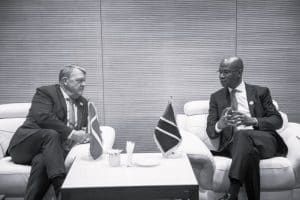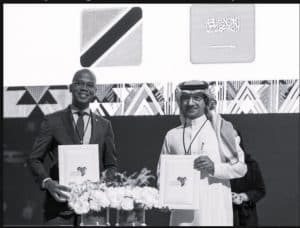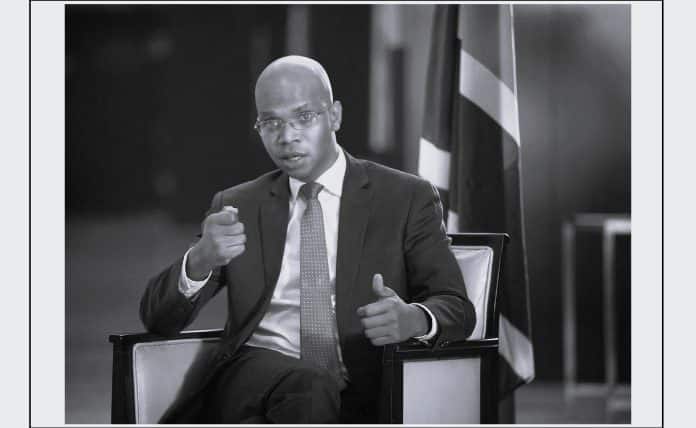Strengthening International Relations: How Tanzania’s Ministry of Foreign Affairs and East African Cooperation is Propelling the Nation Forward
In today’s globalized world, strong international relations are essential for a nation’s economic growth and influence on the global stage. Tanzania, a vibrant country in East Africa, recognizes the significance of nurturing international ties and has made significant strides in this regard through its Ministry of Foreign Affairs and East African Cooperation.
Working tirelessly to strengthen diplomatic relations with countries across the globe, the Ministry of Foreign Affairs and East African Cooperation Tanzania has emerged as a driving force in propelling the nation forward. Through diplomatic negotiations, cultural exchanges, and international collaborations, Tanzania is forging meaningful connections with countries far and wide.
By maintaining a brand voice of diplomacy and collaboration, the Ministry of Foreign Affairs and East African Cooperation is spearheading Tanzania’s endeavors to promote peace, foster economic cooperation, and enhance cultural understanding. With a focus on sustainable development and regional integration, Tanzania is positioning itself as a key player in the global arena.
As Tanzania continues to broaden its diplomatic horizons and deepen its relationships with other nations, the Ministry of Foreign Affairs and East African Cooperation plays a pivotal role in advancing the nation’s interests and aspirations on a global scale. Together, they pave the way for a brighter future, built on mutual respect, cooperation, and shared goals.
The Importance of International Relations for Tanzania

International relations play a crucial role in Tanzania’s development and progress. The country recognizes that establishing strong diplomatic ties and maintaining positive relationships with other nations is vital for its economic growth, security, and influence on the global stage. By fostering international cooperation, Tanzania can attract foreign investments, access new markets, and benefit from technological advancements and knowledge transfer.
Through international relations, Tanzania can also address common challenges such as climate change, poverty, and terrorism by collaborating with other nations and organizations. Additionally, strong international relations can enhance Tanzania’s cultural and educational exchanges, promoting mutual understanding and appreciation of different cultures. It is through these interactions that Tanzania can showcase its rich heritage and contribute to the global cultural landscape.
Achievements and Initiatives of the Ministry of Foreign Affairs and East African Cooperation
The Ministry of Foreign Affairs and East African Cooperation Tanzania has been instrumental in advancing Tanzania’s international relations agenda. Under its leadership, Tanzania has achieved significant milestones and embarked on various initiatives to strengthen diplomatic ties and promote regional integration.
One notable achievement is Tanzania’s active participation in the East African Community (EAC), a regional intergovernmental organization comprising six East African countries. The EAC aims to promote economic, social, and political integration among its member states. Tanzania’s involvement in the EAC has facilitated cross-border trade, investment, and infrastructure development, fostering economic growth and regional stability.
The Ministry of Foreign Affairs and East African Cooperation Tanzania has also played a crucial role in enhancing Tanzania’s bilateral relationships with neighboring countries. Through diplomatic efforts, Tanzania has established strong ties with countries like Kenya, Uganda, Rwanda, and Burundi. These relationships have led to increased trade, tourism, and cultural exchange, benefiting both Tanzania and its neighboring nations.
Furthermore, the Ministry has spearheaded efforts to strengthen Tanzania’s engagement with international organizations. Tanzania is an active member of the United Nations (UN), African Union (AU), and Southern African Development Community (SADC), among others. By participating in these organizations, Tanzania can voice its concerns, contribute to decision-making processes, and collaborate with other nations to address global challenges.
Bilateral and Multilateral Relationships with Neighboring Countries
The Ministry of Foreign Affairs and East African Cooperation Tanzania has placed significant emphasis on nurturing bilateral relationships with neighboring countries. These relationships are crucial for regional stability, economic development, and cooperation in addressing common challenges.
One of Tanzania’s closest and most important relationships is with Kenya. The two countries share a long history of cooperation and collaboration, with strong economic and cultural ties. Tanzania and Kenya have implemented various joint initiatives, such as the East African Crude Oil Pipeline project, which aims to transport oil from Uganda to the Kenyan coast. This project not only strengthens the economic partnership between the two countries but also promotes regional integration and mutual prosperity.
Tanzania’s relationship with Uganda is also of great significance. The two countries have worked together on the development of infrastructure, including the Standard Gauge Railway, which will connect the two nations and facilitate trade and transportation. Additionally, Tanzania has supported Uganda in its efforts to address regional security challenges, demonstrating the commitment to maintaining peace and stability in the East African region.
Rwanda and Burundi are two other neighboring countries with which Tanzania enjoys strong bilateral ties. These relationships have resulted in increased trade, tourism, and cultural exchange, contributing to the overall growth and prosperity of the region. Tanzania’s efforts to strengthen these relationships highlight its commitment to regional integration and cooperation.
In addition to bilateral relationships, Tanzania actively participates in multilateral initiatives within the East African region. The East African Community (EAC), mentioned earlier, plays a vital role in promoting economic integration, regional peace, and stability. Tanzania’s involvement in the EAC has contributed to the harmonization of trade policies, the establishment of a common market, and the free movement of goods, services, and people within the region.
Tanzania’s Role in Regional Organizations and Initiatives
Tanzania’s active participation in regional organizations and initiatives further demonstrates its commitment to strengthening international relations. As a member of the African Union (AU), Tanzania collaborates with other African nations to address common challenges and promote the continent’s development. The AU provides a platform for Tanzania to contribute to discussions on peace and security, economic development, and the protection of human rights.
Tanzania is also a member of the Southern African Development Community (SADC), a regional organization focused on promoting socio-economic development, regional integration, and regional peace and security. Through its involvement in the SADC, Tanzania has been able to participate in decision-making processes that shape the region’s development agenda.
Moreover, Tanzania has been actively engaged with the United Nations (UN) through its membership in various UN bodies and agencies. Tanzania’s presence in the UN allows it to contribute to global efforts in areas such as peacekeeping, climate change, and sustainable development. By participating in these international forums, Tanzania can advocate for its interests and priorities while collaborating with other nations to address global challenges.
Economic and Trade Partnerships Facilitated by the Ministry of Foreign Affairs
The Ministry of Foreign Affairs and East African Cooperation Tanzania has been instrumental in facilitating economic and trade partnerships for the country. By leveraging its international relations, Tanzania can attract foreign direct investment, access new markets, and develop mutually beneficial trade agreements.
Tanzania has actively pursued economic cooperation with countries across the globe, including China, India, and the United States. These partnerships have resulted in significant investments in sectors such as infrastructure, energy, agriculture, and manufacturing. Furthermore, Tanzania has sought to diversify its export markets, reducing its reliance on traditional trading partners and exploring opportunities in emerging economies.
China’s Belt and Road Initiative (BRI) has played a significant role in Tanzania’s economic development. Through infrastructure projects like the construction of the Bagamoyo Port and the Tanzania-Zambia Railway, China has contributed to Tanzania’s transportation and logistics capabilities, opening up new trade routes and facilitating regional connectivity.
India is another important economic partner for Tanzania. The two countries have collaborated on various projects, including the development of the agricultural sector, information and communication technology, and capacity-building programs. India’s investments have contributed to Tanzania’s economic growth and job creation, while also fostering technological advancements and knowledge transfer.
The United States has also been a key trading partner for Tanzania. Through the African Growth and Opportunity Act (AGOA), Tanzania has enjoyed preferential access to the U.S. market, promoting exports and attracting investment. The Ministry of Foreign Affairs and East African Cooperation has played a crucial role in facilitating trade negotiations and promoting Tanzania’s business-friendly environment to international investors.
Cultural and Educational Exchange Programs
In addition to economic partnerships, Tanzania’s Ministry of Foreign Affairs and East African Cooperation has prioritized cultural and educational exchange programs. These initiatives promote mutual understanding, cultural appreciation, and academic collaboration between Tanzania and other nations.
Tanzania’s cultural exchange programs aim to showcase the country’s diverse heritage and traditions to the rest of the world. Through cultural festivals, exhibitions, and artistic performances, Tanzania can foster cross-cultural dialogue and strengthen people-to-people connections. By sharing its rich cultural heritage, Tanzania can attract tourists, promote cultural tourism, and enhance its global reputation.
Educational exchange programs have also been a focus of Tanzania’s international relations efforts. The Ministry of Foreign Affairs and East African Cooperation collaborates with foreign governments and educational institutions to facilitate student exchanges, research collaborations, and knowledge sharing. These initiatives provide Tanzanian students with opportunities to study abroad, gain international exposure, and acquire new skills and knowledge that can contribute to the country’s development.
Furthermore, Tanzania has welcomed international students and scholars to its universities and research institutions, promoting academic diversity and fostering global research collaborations. By attracting talented individuals from around the world, Tanzania can benefit from their expertise and contribute to the advancement of knowledge in various fields.
Challenges and Future Prospects for Tanzania’s International Relations
While Tanzania has made significant progress in strengthening its international relations, several challenges persist. One major challenge is the limited resources available for diplomatic efforts. Tanzania, like many developing nations, faces budgetary constraints that can hinder its ability to invest in diplomatic missions, maintain embassies abroad, and engage in high-level diplomatic negotiations. To overcome this challenge, Tanzania must prioritize and strategically allocate resources to maximize its diplomatic impact.
Another challenge is the need to balance national interests with regional and global commitments. Tanzania must navigate complex geopolitical dynamics and ensure that its international engagements align with its national priorities. By striking a balance between pursuing its own interests and contributing to regional and global objectives, Tanzania can enhance its reputation as a responsible and reliable international partner.
Looking ahead, Tanzania’s international relations hold immense potential for the nation’s future. By capitalizing on its geographic location, natural resources, and vibrant culture, Tanzania can continue to attract foreign investments, expand trade partnerships, and promote cultural exchanges. With a focus on sustainable development and regional integration, Tanzania can position itself as a key player in Africa’s economic transformation and contribute to the continent’s global influence.
The Role of Diplomacy in Strengthening International Relations
Diplomacy plays a crucial role in strengthening international relations and advancing a nation’s interests on the global stage. Tanzania’s Ministry of Foreign Affairs and East African Cooperation serves as the primary driver of the country’s diplomatic efforts, employing various diplomatic tools and strategies to foster cooperation, resolve conflicts, and promote peace and stability.

At the core of Tanzania’s diplomatic engagements is the principle of mutual respect and understanding. Through diplomatic negotiations, Tanzania seeks to find common ground, build trust, and establish long-term relationships with other nations. Diplomacy allows Tanzania to address common challenges, such as climate change, terrorism, and poverty, through dialogue and collaboration.
Additionally, diplomacy enables Tanzania to advocate for its interests and priorities on the international stage. Through diplomatic channels, Tanzania can participate in global decision-making processes, shape international policies, and contribute to the resolution of conflicts. Diplomacy also allows Tanzania to build alliances and coalitions with like-minded nations, amplifying its voice and influence.
In an increasingly interconnected and interdependent world, diplomacy is essential for navigating complex geopolitical landscapes and resolving conflicts peacefully. The Ministry of Foreign Affairs and East African Cooperation Tanzania plays a critical role in promoting diplomacy, ensuring that Tanzania’s international engagements are guided by principles of diplomacy, collaboration, and mutual respect.
Tanzania’s Vision for a Prosperous and Interconnected Future
Tanzania’s Ministry of Foreign Affairs and East African Cooperation is at the forefront of the nation’s efforts to strengthen international relations and propel the country forward. Through diplomatic negotiations, economic partnerships, cultural exchanges, and educational collaborations, Tanzania is forging meaningful connections with countries across the globe.
With a focus on sustainable development, regional integration, and mutual cooperation, Tanzania is positioning itself as a key player in the global arena. By leveraging its international relations, Tanzania aims to attract foreign investments, expand trade partnerships, promote cultural diversity, and contribute to global efforts in addressing common challenges.
As Tanzania continues to broaden its diplomatic horizons and deepen its relationships with other nations, the Ministry of Foreign Affairs and East African Cooperation will play a pivotal role in advancing the nation’s interests and aspirations on a global scale. Together, they pave the way for a brighter future, built on mutual respect, cooperation, and shared goals.
Tanzania’s vision for a prosperous and interconnected future relies on its commitment to diplomacy, collaboration, and sustainable development. By nurturing strong international relations, Tanzania aims to position itself as a respected global partner, contributing to regional stability, economic growth, and cultural exchange. With the Ministry of Foreign Affairs and East African Cooperation Tanzania at the helm, the country is well-equipped to navigate the complexities of the globalized world and propel the nation forward.
For more articles related to Government of Tanzania and the Society (Community), click here!


































